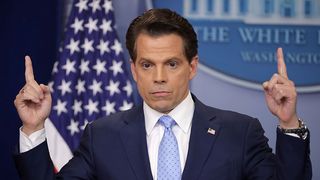The White House is about to get a whole lot meaner. In recent weeks, Donald Trump has started cleaning house, shedding his chief of staff Reince Priebus and press secretary Sean Spicer. Jeff Sessions, his attorney-general, seems at risk of getting pink-slipped. But just as important as the personnel purge is the way it's being done, with priority given to muscular bullying and maximal cruelty. We're getting closer to a purely Trump White House – and that spells real trouble, not only for the administration but for Trump himself.
Nothing exemplifies the administration's growing cruelty more than the new communications director, Anthony Scaramucci. He comes straight from central casting, a caricature of the 1980s greed-is-good Wall Street slickster. In a now-infamous conversation with the New Yorker's Ryan Lizza, Scaramucci unleashed a stream of vulgarities, threats and bluster against fellow members of the administration. Trump loved it.
Just as important as the personnel purge is the way it's being done, with priority given to muscular bullying and maximal cruelty
That should come as no surprise. On the campaign trail and now in office, Trump has shown an inclination for crudeness and roughness. And in recent weeks, particularly since his son Donald jnr became entangled in the Russia investigation, Trump has indulged his core cruelty much more freely.
In particular, Trump has singled out Sessions for public bullying, viciously attacking the attorney-general as though he were an outside political opponent, not a key member of the administration. On Twitter, where Trump has been especially active since Spicer's resignation, Trump has labelled Sessions "weak" and "beleaguered", And in an interview with the New York Times, he railed against Sessions' decision to recuse himself from the Russia investigation, making clear that he regrets asking Sessions to join the administration (while at the same time refusing to fire him).
These attacks on Sessions, like those on Priebus and Spicer, show the limits of Trump's concept of loyalty. It only buys you about six months in his administration – and at least three of those are pretty brutal. In the case of Priebus, Trump treated him like a personal minion. In one meeting he put Priebus in charge of killing a fly that had made its way into the Oval Office. And in a final indignity, he announced Priebus' replacement – and own sudden unemployment – over Twitter.
If the White House is getting a whole lot meaner, it's also getting a whole lot less Republican. Priebus and Spicer were the main ties between Trump and the official apparatus of the Republican Party.
If the White House is getting a whole lot meaner, it's also getting a whole lot less Republican. Priebus and Spicer were the main ties between Trump and the official apparatus of the Republican Party. Priebus had served as the chair of the Republican National Committee, and Spicer was the committee's communications director. With both men gone, there are few formal ties between the party and the president.
That change means that White House personnel more accurately reflect Trump's own attitude toward the GOP. From the start, he's been a president unmoored from his party. That is evident in the way he talks about Republicans: them, not us, as though they're a separate faction unrelated to his own political fortunes.
Such independence from the party has its upsides. Indeed, it was part of Trump's initial appeal. He has never been part of the party establishment. Heck, he hasn't even been part of the party itself for long, most recently rejoining the GOP in 2012.
But Trump is someone in desperate need of allies, as he's fast alienating as many people as possible. His attacks on Republicans in Congress are far outside the norm, ranging from public criticisms of tactics and policy to threats to support primary challenges to long-time Republican officeholders. Over Twitter, he regularly dictates strategy to Republican leaders in Congress, advice that is met with eye-rolls and resentment.
That disdain matters. With Trump's poll numbers barely breaking 40 per cent (and only in the most favourable polls), there's less and less reason for Republicans in Congress to prop him up or heed his wishes. That may not seem like a big deal – after all, Republicans in Congress can't seem to get their own priorities passed, much less the president's – but there's one arena where congressional support makes a huge difference: investigations.
Right now, prosecutorial power rests with the special counsel, Robert Mueller. But Congress continues to hold hearings into Russian interference in the 2016 election – investigations that could quickly spin out into conflicts of interest, financial entanglements, obstruction of justice, and yes, even impeachment. Congress can issue subpoenas and make witnesses testify under oath. By making it easier for Republicans to stand up to him, Trump is endangering his own presidency.
Six months into his presidency, Trump is becoming increasingly irrelevant to the goings-on in Washington. Policy is largely in the hands of his vice-president and Republicans in Congress, with the president left to heckle from the sidelines. But if Trump is becoming more marginal, he is also becoming more unpredictable and cruel, as are the staff members around him.
The recent shake-ups make clear there's a personnel problem in the White House, but they also make clear that it's a problem that hirings and firings can't solve. Because the problem employee in question sits in the Oval Office, and he's settling in for a long, drawn-out fight.






